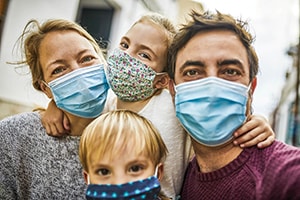By Lola Duffort/VTDigger
State officials announced last week that students and staff should start the school year masked but could bare their faces once 80% of students in a school had received their Covid-19 shots.
Two days later, the Agency of Education and Dept. of Health issued a two-page memo, which reiterated — but did little to elaborate on — what had been announced at Gov. Phil Scott’s press conference. For many experts watching as the Delta variant takes hold in Vermont and cases spike, that’s not nearly good enough.
“We need guidance that recognizes the rapidly evolving evidence on the Delta variant, describes a layered mitigation approach and also provides detailed strategies for implementing it in a school setting,” said Anne Sosin, a rural health researcher and policy fellow at Dartmouth College’s Nelson Rockefeller Policy Center. “I think in all three respects the guidance falls short.”
The state has already slightly altered its strategy. At last Tuesday’s press conference, the governor initially announced that schools should drop mask mandates once 80% of eligible students had received one dose of a Covid-19 vaccine. But at the urging of the Vermont chapter of the American Academy of Pediatrics — which said the 80% threshold should be pegged to full, not partial, vaccination — the written guidance released Thursday adopted a two-dose standard.
Still, alarmed by a surge in cases, many experts said the state’s guidance remains insufficient to keep kids safe.
Yves Dubief, an associate professor of mechanical engineering at UVM who has studied the fluid dynamics of Covid-19 droplets as they travel through the air, said he was “very disappointed” to see the state’s advisory omit all mention of ventilation.
The state should be doing more to ensure that schools have the tools to improve ventilation — by opening windows, for example, and purchasing air purifiers with HEPA filters — even if a full overhaul is unrealistic, he said. But excellent ventilation alone is not enough, he said, and universal masking and vaccination will be necessary to control transmission.
“We are sending kids into a situation where we basically are crossing our fingers and hoping there’s no one in this classroom that is going to show up with Delta. But if one kid has Delta, it’s going to go very fast,” he said.
Dubief said his own employer, UVM, had invested far more money to improve ventilation than any secondary school could hope to have at its disposal. Yet, like several other colleges across the state, it reinstated an indoor masking mandate late last week.
“Why do we think our K-12 is safer than a campus of fully vaxxed students?” Dufief said. (UVM is also mandating students be vaccinated.)
Conditions are changing quickly in Vermont, where the health department this weekend recorded daily case counts not seen in the state since April. And some experts who had sounded an optimistic note just weeks or days ago now say that rapidly deteriorating conditions call for more aggressive measures.
Annie Hoen, a Dartmouth College epidemiologist, told VTDigger last week that she generally approved of the state’s school masking guidance. But during the weekend, she contacted a reporter to say growing reports of pediatric hospitalizations had changed her mind.
“I am not sure I can imagine a scenario where I would consider it safe to discontinue universal masking this fall,” Hoen wrote. “80% is probably too low of a threshold vaccination rate to entertain the idea of ending masking. I think even with universal masking and some teachers and students vaccinated, schools could be in for a rougher time this year than last year.”
It is not yet known if Delta is more likely to cause severe illness in children than earlier iterations of the virus. But a surge in cases has led to a nationwide spike in hospitalized minors.
In late July, Tim Lahey, an infectious disease expert at the University of Vermont Medical Center, told VTDigger he believed case counts were still too low to require vaccinated people to mask indoors come the fall. By Monday, that had changed.
“We should plan for everyone in school above age 2 to wear masks if they can. With case counts and hospitalizations clearly rising now, I would be surprised if masking in school only lasts a few weeks,” he wrote in an email.
Lahey even added that hybrid schooling — an option that state leaders have strongly discouraged — may need to be put back on the table for older students.
“We don’t have all the information we need right now, but teachers need time to plan ahead so we’re going to have to make informed predictions of the future,” he continued. “It won’t be perfect, but that’s what it’s like living life in the uncertainty of a global pandemic.”




